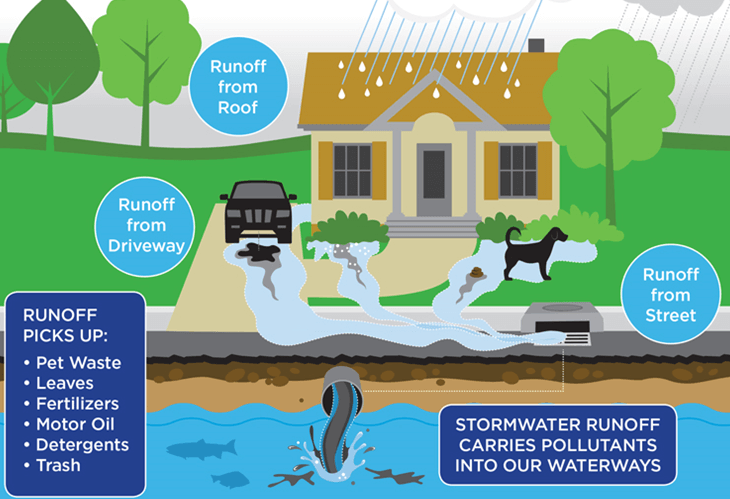13 Tips to Protect Your Drinking Water

No matter where you live, work or play, you are always in a watershed. New Cumberland Borough has two watersheds, the Susquehanna River and the Yellow Breeches. A watershed is an area of land that channels rainfall and snowmelt to creeks, streams, and rivers. These watersheds are full of life and provide habitat for fish, birds and wildlife. They are also a source of drinking water for homes and businesses. It’s important to know this because the things we do outside impacts our waterways.
The next time it rains, watch the water move from your roof and your driveway down the street. Some of it soaks into the soil to become groundwater. Some of it evaporates into the air. But most of it is on its way to the nearest storm drain, which discharges directly into a stream, lake, river, or wetland. It’s the same for water from snowmelt, sprinklers, hoses, and other sources. This water is referred to as stormwater runoff. As it flows over the land, it picks up and carries pollutants, litter, and sediments. Along the way, excess fertilizers and pesticides, pet waste, motor oil, antifreeze, cigarette butts, and other debris on the streets all can hitch a ride into the nearest storm drain. Runoff also causes sudden increases in the amount and speed of water flowing into bodies of water, resulting in increased erosion of stream banks and localized flooding.
There’s a lot you can do to reduce stormwater runoff and to help protect the source of our drinking water and wildlife habitat. Start by doing one of the actions on the list below.
- Maintain your vehicles and fix leaks. Always recycle or properly dispose of products that contain chemicals. Never dispose of chemicals in the lawn or storm drain. Cumberland County has a Household Hazardous Waste Program (HHWP) that’s offered four times a year at their Cumberland County Recycling Center, 1001 Claremont Road, Carlisle, PA. Here are the remaining dates in 2023:
- Saturday, August 19, 2023, 9 am to 3 pm
- Thursday, October 26, 2023, 11 am to 5 pm
- Never dump anything down a storm drain.
- Take your vehicle to the car wash. If you wash your car at home, wash it on your lawn, not in the street or your driveway.
- Drive less, and take a bus, carpool, bike or walk.
- Consider installing a rain garden as a great way to recycle water and to use around the yard for watering gardens.
- Pick up after your pet. Pet waste can be a source of bacteria and can lead to contamination of our waterways.
- Use organic mulch and environmentally friendly pest control when possible.
- Use fertilizers, pesticides, and herbicides sparingly. Never apply them before a rainstorm as much of it will be washed into nearby storm drains. Consider using organic fertilizers.
- To reduce pesticides: landscape for low maintenance and use native plants, flowers and trees to aid pest control; and use integrated pest management strategies (IPM) to control pests.
- Let your lawn go golden brown in the summer months; it will rebound in the fall.
- Compost or mulch yard waste. To reduce fertilizer, use a mulching mower and cut 1/3 of the height of the grass. Clipped grass adds nutrients back into the soil.
- Cut grass more often and only when dry.
- Compost yard waste and use it in flower beds and gardens.



 (717) 774-0404
(717) 774-0404 1120 Market Street, New Cumberland, PA
1120 Market Street, New Cumberland, PA 8:30 a.m. - 4:30 p.m. Mon - Fri
8:30 a.m. - 4:30 p.m. Mon - Fri